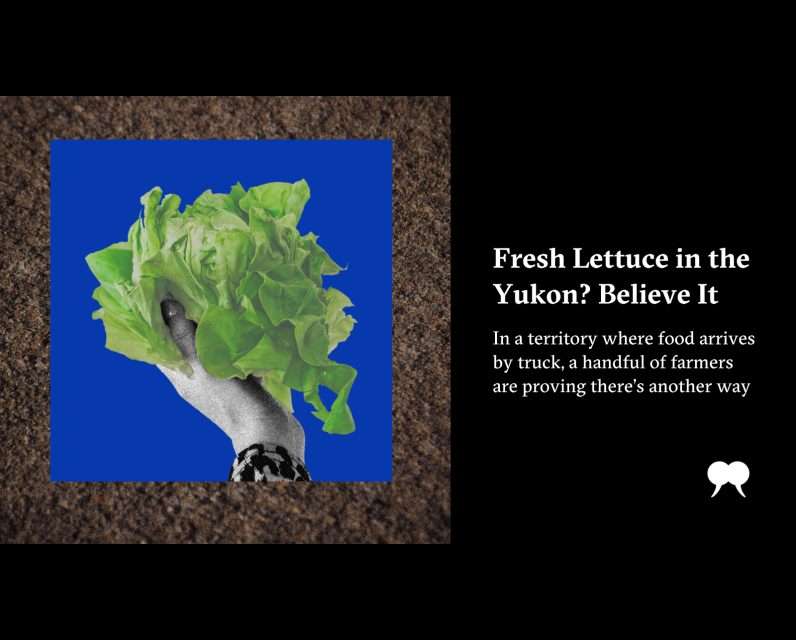Fresh Lettuce in the Yukon? Believe It

It’s almost a summer ritual. One—or both—of the highways connecting the Yukon to southern Canada shuts down because of wildfires or floods. If the closure lasts a few days, grocery shelves in Whitehorse start to empty. I still remember struggling to find salad greens in July 2022, after the Alaska Highway was washed out in northern British Columbia.
Nearly everything Yukoners eat is trucked in. Only an estimated 2 to 4 percent is commercially cultivated here. A short growing season, limited arable land, and poor-quality soil make farming an unforgiving grind. In recent years, the precarity of our food supply has become more and more obvious, with the Yukon Agricultural Association seeing an uptick in inquiries about what’s available locally and where to buy it. (The YAA refers people to its online directory, the Yukon Farm Guide.)
But while agriculture might seem a no-go so far north, a small, resourceful band of farmers and producers is proving otherwise. In fact, you might be surprised by what can be coaxed from the land. Whitehorse stores sell potatoes, vegetables, eggs, flour, baking mixes, and sausages. A cheese shop stocks Polarbert from a dairy close to Dawson City. At markets, you can find sundry veggies. (Back in 2022, on the hunt for leafy greens, I located some in Sarah’s Harvest, an organic garden about fifty kilometres north of Whitehorse.) Across the Klondike River, a nursery yields apples and grapes. First Nations are involved too: since 2014, the Tr’ondëk Hwëch’in Farm has supplied the Dawson area with fresh produce such as lettuce and, in more recent years, eggs and meat.
That shift—toward local control over what communities eat—is happening across the North. Remote regions are looking for ways to feed themselves on their own terms, from a Manitoba program that pays hunters to supply their communities to a Yellowknife “farm store” stocked with fresh staples. In the Yukon, it means scouring for pockets of fertile land. Or climate-controlled cold storage to keep potatoes on shelves long past harvest. Or turning to greenhouses—greenhouse space in the Yukon and Northwest Territories grew nearly 55 percent from 2016 to 2021, more than twice the national pace. Some are even making their own soil.
“We live at the end of a supply chain that can be cut off overnight,” Hanna Fish, the YAA’s executive director, wrote in an email. “Every Yukon-grown potato and every Yukon-produced egg is a buffer against empty shelves.”
Few people know that better than Al and Cathy Stannard. They own Mandalay Farm, north of Whitehorse, where they tend to 4,400 chickens year round. Their brown, free-range Little Red Hen–branded eggs are on shelves in grocery stores across the territory. They sell to corporate clients too, such as Air North, Whitehorse General Hospital, and local hotels.
The Stannards bought their property in 2009. Al was working as a helicopter pilot and Cathy as a nurse, but he’d always wanted to farm. “The purpose of this is to feed people,” he says. They began with meat birds—chickens and turkeys—but couldn’t regularly access an abattoir for slaughter. With eggs, they could be more self-reliant. Though raising laying hens in the North has its own challenges.
Power is more expensive, technical support is harder to access, and part suppliers are further away, which means shipping costs more. Al fixes everything himself and coordinates his own bimonthly deliveries of chicken feed from Edmonton, paying for the truck on top of the shipment. He also stockpiles eighty-eight tons of feed over the winter, in case roads close due to bad weather. (In southern Canada, feed companies typically deliver directly to farms every week.) Al also grades his own product, meaning he has equipment on the property that processes, washes, dries, and weighs the eggs. This is why Fish describes Yukon farmers’ role as “A to Z production.” They don’t just grow but also package and market.
The Stannards once set out to raise 30,000 chickens—an ambitious target for the Yukon but fairly routine elsewhere in Canada. While Yukoners have thrown their support behind Al’s eggs, Al says government policies are stunting their growth. For one, the Yukon doesn’t come under the federal quota system, a supply-management program that regulates egg production and guarantees farmers an income. (The territorial government says it’s exploring it.)
Not being part of that system means greater instability: the Stannards don’t qualify for grant programs, and banks are reluctant to finance expansion. “It’s soul crushing to watch what you know is a good business, and the only reason it is not accelerating wildly is because we have been held back on funding for loans,” Al says. “We love what we do, but that doesn’t mean we should go bankrupt feeding people.”
One obvious way to help, he argues, would be for the Yukon government to buy locally for public facilities such as schools, seniors’ homes, or even the Whitehorse jail. Yet, according to the CBC, between 2021 and 2024, the territory spent more than $9.6 million on food from global distributor Sysco and just $124,000 on goods grown in the Yukon.
For farmers like the Stannards, that gap isn’t just a missed economic opportunity. It’s a signal of how far local agriculture still has to go to be truly valued.
Before the US trade war prompted a wave of grocery nationalism, and before the pandemic disrupted global supply chains, Suzanne Crocker undertook an experiment. For one year, starting in 2017, she and her family (which included three “skeptical” teens) would only eat food hunted, gathered, raised, or grown around Dawson City, on the traditional territory of the Tr’ondëk Hwëch’in.
Crocker admits some people thought she was crazy, but many were keen to help. Farmers, cooks, and elders offered tips and wisdom. She made string cheese from Dawson dairy, using rhubarb juice in place of vinegar; salad dressing using haskap berries, birch syrup, and crushed garlic; and baked goods using egg whites for leavener. She also had to eliminate many staples from her diet: rice, salt, baking powder, pasta, coffee, oil, granulated sugar.
Crocker turned the experience into a documentary, First We Eat, taking the title from food writer M. F. K. Fisher’s famous line: “First we eat, then we do everything else.” For Crocker, it’s a reminder of how foundational food is, even if we treat it like an afterthought. “It doesn’t just magically appear under a piece of saran wrap in a store,” she says.
Six years later, 75 percent of her diet is still local: root vegetables in the winter, for instance, and salad greens and fresh berries in the summer. It also changed how she thinks about farmers. “They’re on a pedestal for me now, and I feel like they should be for everybody,” she says. But she warns they can’t be expected to save the day only when disaster strikes. “You have to support them all the time.”
The post Fresh Lettuce in the Yukon? Believe It first appeared on The Walrus.

Comments
Be the first to comment